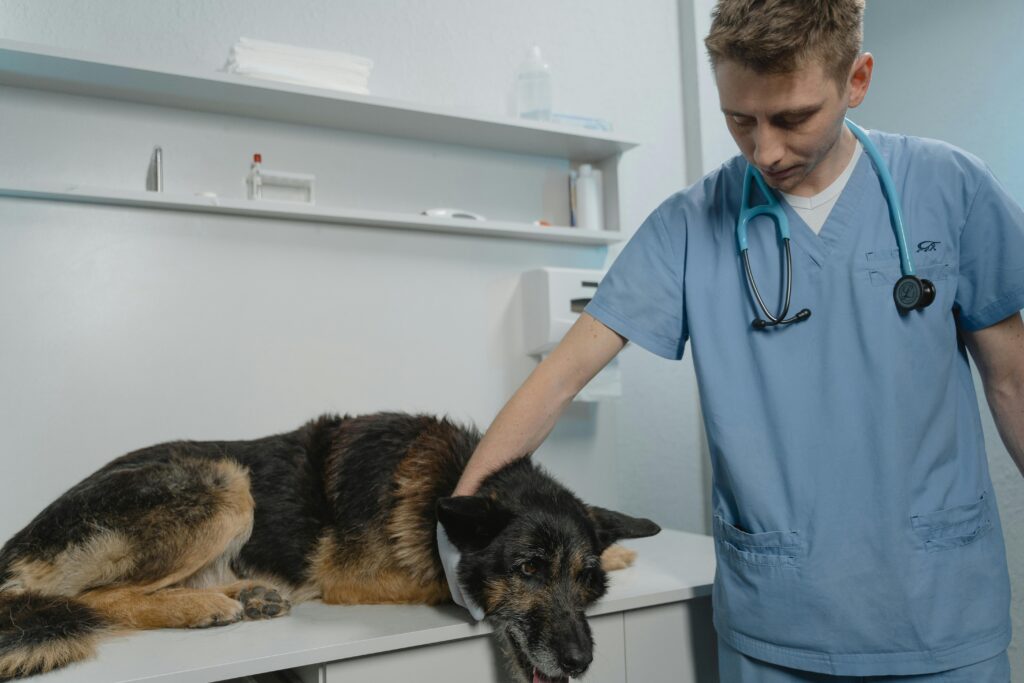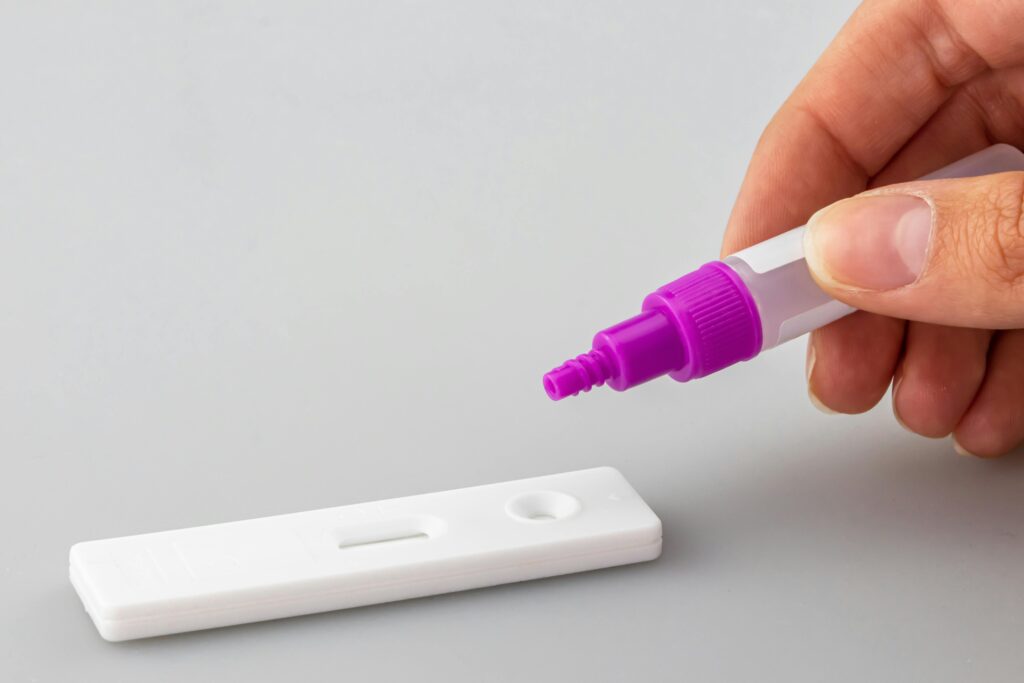Both people and animals often have reactions to their pets. If your pet has allergies, they might be in pain and have health issues. It can improve a pet’s quality of life to learn early how to spot the signs of allergens and treat them. This article talks about the most common symptoms of pet allergies and gives you natural, effective ways to deal with them.

Understanding Pet Allergies and Why They Happen in Cats, Dogs, and Other Animals
Pet allergies don’t come from fur alone. They are caused by proteins produced by animals that trigger an immune reaction in sensitive people. These allergens can spread easily and linger in the environment, even when pets are not nearby.
What Triggers Pet Allergies?
Pet allergies occur when the immune system mistakes harmless proteins for dangerous invaders. In response, the body releases chemicals like histamine, which cause allergy symptoms such as sneezing, itching, and watery eyes.
These proteins are found in:
- Dander (tiny flakes of dead skin)
- Saliva
- Urine
- Sweat and skin oils
When pets groom themselves, these proteins stick to their fur and are released into the air or onto surfaces around the home.
Why Cats and Dogs Commonly Cause Allergies
Cats and dogs are the most common sources of pet allergies because they shed dander frequently and live closely with humans.
- Cats produce a powerful allergen called Fel d 1, mainly found in saliva and skin glands. When cats lick their fur, the allergen spreads and becomes airborne once dry.
- Dogs produce allergens in their dander, saliva, and urine. Some breeds shed more or produce higher levels of allergenic proteins, which can increase reactions.
Example:
A person may start sneezing and experience itchy eyes shortly after petting a cat, even if the cat doesn’t shed much fur. The reaction is caused by allergens in the cat’s saliva and dander, not the fur itself.
Pet Allergies from Other Animals
Other animals can also trigger allergic reactions, including:
- Rabbits and guinea pigs (dander and urine)
- Birds (feathers, droppings, and feather dust)
- Rodents such as hamsters and mice (urine proteins)
These allergens can accumulate in cages, bedding, and surrounding air, especially in enclosed spaces.
Example:
A child with a pet hamster may develop a runny nose or skin rash after cleaning the cage due to exposure to urine-based allergens.
Why Allergy Symptoms Vary from Person to Person
Not everyone reacts to pet allergens the same way. Factors that influence reactions include:
- Individual immune sensitivity
- Length and frequency of exposure
- Type of animal and allergen level
- Existing conditions like asthma or eczema
Some people may have mild symptoms, while others experience severe respiratory issues.
Pet allergies often appear on the skin first; you should never ignore these signs.
One of the earliest and most noticeable signs of pet allergies is a skin reaction. Because the skin comes into direct contact with pet allergens—such as dander, saliva, and fur—it often reacts before respiratory symptoms like sneezing or coughing appear.

Why Skin Is the First Area Affected
Pet allergens easily settle on the skin when you:
- Pet or cuddle animals
- Get licked by a pet
- Touch surfaces covered in pet hair or dander
When these allergens come into contact with sensitive skin, the immune system may overreact, causing visible irritation almost immediately.
Common Skin Symptoms to Watch For
Skin-related pet allergy symptoms may include:
- Redness or inflammation
- Itching or a burning sensation
- Hives or raised bumps
- Dry, flaky patches
- Worsening of existing eczema
These symptoms can appear on the hands, arms, face, neck, or areas frequently exposed to pets.
Why You Should Never Ignore These Signs
Ignoring early skin reactions can allow the allergy to worsen over time. What starts as mild itching may develop into persistent rashes or lead to additional symptoms such as nasal congestion, watery eyes, or asthma flare-ups. Early recognition allows for quicker management and prevents prolonged discomfort.
Real-Life Example
For example, someone who is mildly allergic to cats may notice itchy red patches on their hands after playing with a cat. If this sign is ignored and exposure continues, the person may later develop sneezing, eye irritation, or breathing difficulties when around the same pet.
How to Manage Skin Reactions from Pet Allergies
If skin symptoms appear:
1. Consult a healthcare provider if reactions persist.
2. Wash the affected area with mild soap and water.
3. Avoid touching your face after pet contact.
4. Use fragrance-free moisturizers or anti-itch creams.
5. Limit direct contact with pets until symptoms improve.
Digestive Symptoms of Allergies That May Be Linked to Food Sensitivities in Pets
Not all pet allergies show up on the skin or in the ears. In many cases, food-related allergies or sensitivities affect the digestive system, leading to ongoing stomach and bowel problems. These symptoms are often overlooked or mistaken for minor digestive issues.
How Food Allergies Affect a Pet’s Digestive System
Food allergies occur when a pet’s immune system mistakes a specific ingredient as harmful. This triggers inflammation in the gastrointestinal tract, which can interfere with normal digestion and nutrient absorption.
Unlike food intolerances, which mainly cause digestive upset, food allergies involve an immune response and may also be linked to skin or ear problems.
Common Digestive Symptoms in Pets with Food Allergies
Pets with food-related allergies may experience:
- Chronic or recurring diarrhea
- Frequent vomiting or regurgitation
- Excessive gas or bloating
- Soft stools or mucus in the stool
- Increased bowel movements
- Weight loss despite a normal appetite
These symptoms often persist over time rather than appearing as a one-time stomach upset.
Signs Digestive Issues May Be Allergy-Related
Digestive symptoms are more likely linked to food sensitivities if:
- Symptoms last for weeks or months
- The pet does not improve with routine deworming or probiotics
- Digestive problems occur alongside itchy skin, paw licking, or ear infections
- Symptoms improve when the diet is changed
Common Food Allergens for Pets
Some of the most frequent food allergens in pets include:
- Beef
- Chicken
- Dairy products
- Eggs
- Wheat or corn
- Soy
Pets can develop allergies even to foods they have eaten for years.
Example: Digestive Symptoms Caused by Food Sensitivity
A dog experiences loose stools and vomiting several times a week. Initial tests show no parasites or infections. After switching to a limited-ingredient diet that removes chicken and beef, the digestive symptoms gradually resolve within a few weeks—confirming a food sensitivity as the cause.
How Digestive Allergy Symptoms Are Managed
Managing digestive symptoms linked to food allergies may involve:
- An elimination diet or hydrolyzed protein diet
- Strict avoidance of the trigger ingredient
- Reading pet food labels carefully
- Veterinary guidance to ensure balanced nutrition
Improvement usually occurs within 6–8 weeks once the offending food is removed.
Respiratory Symptoms in Allergic Pets That Can Affect Breathing and Overall Comfort
Respiratory symptoms are one of the most noticeable and concerning signs of allergies in pets. When a pet inhales allergens—such as pollen, dust mites, mold, or cigarette smoke—their immune system may overreact, causing inflammation in the airways. This can make breathing uncomfortable and reduce a pet’s overall quality of life.

How Allergies Affect a Pet’s Respiratory System
In allergic pets, the lining of the nose, throat, and lungs can become irritated and swollen. This inflammation narrows the airways and increases mucus production, making it harder for the pet to breathe normally. Over time, repeated exposure to allergens can worsen these symptoms and lead to chronic respiratory issues.
Common Respiratory Symptoms in Allergic Pets
Pets with respiratory allergies may show signs such as:
- Frequent sneezing
- Persistent coughing or gagging
- Wheezing or noisy breathing
- Nasal discharge (clear or thick mucus)
- Labored or rapid breathing
Cats may also breathe with their mouths open, while dogs may seem unusually tired after mild activity due to reduced airflow.
How Respiratory Allergies Affect Comfort and Behavior
Breathing discomfort can make pets restless, anxious, or lethargic. They may avoid exercise, sleep more than usual, or appear stressed—especially during allergy flare-ups. In severe cases, respiratory symptoms can interfere with eating, playing, and normal daily activities.
Example: Respiratory Allergies in a Dog
For example, a dog with seasonal allergies may begin coughing and wheezing during spring when pollen levels are high. The dog may also sneeze frequently and show nasal discharge after outdoor walks. As breathing becomes more difficult, the dog may avoid running or seem uncomfortable at rest.
When to Seek Veterinary Care
If a pet shows ongoing coughing, wheezing, or difficulty breathing, veterinary care is essential. A veterinarian can determine whether allergies are the cause and recommend treatments such as antihistamines, corticosteroids, environmental changes, or allergy testing to improve breathing and overall comfort.
Behavioral Changes Caused by Allergies That Affect Your Pet’s Daily Life and Mood
Allergies don’t just cause physical discomfort in pets—they can significantly affect their behavior, routines, and emotional well-being. When pets feel itchy, irritated, or unwell for long periods, their mood and daily habits often change in noticeable ways.
Increased Irritability and Restlessness
Pets suffering from allergies may become easily irritated or restless due to constant itching, skin inflammation, or ear discomfort. This ongoing irritation can make them less tolerant of handling, grooming, or even playtime.
Example:
A normally friendly dog may growl or pull away when touched because their skin feels sore or inflamed.
Excessive Scratching, Licking, or Chewing
One of the most common behavioral signs of allergies is repetitive scratching or licking. Pets may focus obsessively on one area, such as paws, ears, or the belly, which can disrupt sleep and daily activities.
Example:
A cat may lick its paws so frequently that the fur becomes thin or bald, indicating ongoing allergic discomfort.
Changes in Sleep Patterns
Pets with allergies often have difficulty resting comfortably, especially if itching worsens at night. Poor sleep can lead to fatigue and lower energy levels during the day.
Example:
A dog that normally sleeps through the night may wake frequently to scratch or rub against furniture.
Reduced Appetite or Interest in Activities
Chronic discomfort can cause pets to lose interest in food, play, or social interaction. Allergies may also affect digestion in some cases, further contributing to appetite changes.
Example:
A playful puppy may stop engaging in walks or games and spend more time lying down due to discomfort.
Anxiety and Mood Changes
Long-term allergies can lead to stress or anxiety, especially when symptoms are ongoing and untreated. Pets may become withdrawn, clingy, or unusually vocal.
Example:
A cat with untreated allergies may hide more often or become unusually aggressive toward other pets in the household.
Why Early Management Matters
Behavioral changes are often early warning signs that allergies are affecting your pet’s quality of life. Addressing the underlying cause—through veterinary care, diet changes, environmental management, or medication—can greatly improve both physical comfort and emotional health.
Common Causes of Pet Allergies and the Triggers That Often Go Unnoticed at First
Many people assume pet allergies are caused by fur alone, but the real triggers are often more subtle. Understanding these hidden causes can help you identify symptoms earlier and manage allergies more effectively.
1. Pet Dander: The Primary Hidden Allergen
Pet dander consists of tiny flakes of dead skin shed by animals such as cats, dogs, rabbits, and rodents. These microscopic particles can float in the air for long periods and settle on furniture, bedding, and clothing.
Why it’s often unnoticed:
Dander is invisible to the naked eye, so people may not realize they are being exposed—even in clean-looking spaces.
Example:
A person may continue sneezing at night even though their dog never enters the bedroom. Dander carried on clothing or bedding can still trigger symptoms.
2. Saliva Proteins Left Behind After Licking
When pets lick themselves or their owners, allergenic proteins in their saliva are transferred onto skin, fur, furniture, and floors. Once the saliva dries, the allergens remain active.
Why it’s often unnoticed:
Many people enjoy affectionate licking and don’t associate it with allergic reactions.
Example:
A cat owner develops itchy skin after cuddling their pet, not realizing the reaction is caused by dried saliva on the cat’s fur.
3. Pet Urine and Litter Areas
Proteins found in pet urine—especially from cats, rodents, and rabbits—can become airborne as urine dries, particularly around litter boxes and cages.
Why it’s often unnoticed:
Symptoms may be mistaken for dust allergies rather than pet-related exposure.
Example:
A child starts coughing and sneezing after playing near a cat’s litter box, even without touching the cat directly.
4. Fur as an Allergen Carrier, Not the Cause
Pet fur itself is not usually allergenic, but it collects and spreads dander, pollen, dust mites, and saliva throughout the home.
Why it’s often unnoticed:
People may believe that short-haired or low-shedding pets cannot cause allergies.
Example:
A person reacts to a short-haired dog because allergens trapped in the fur are transferred to sofas and carpets.
5. Outdoor Allergens Brought Indoors by Pets
Pets that spend time outside can bring in pollen, mold, and grass allergens on their fur and paws, worsening allergy symptoms indoors.
Why it’s often unnoticed:
Symptoms may be blamed on seasonal allergies instead of pet exposure.
Example:
Someone experiences flare-ups only after their dog returns from outdoor walks during springtime.
6. Poor Ventilation and Fabric Surfaces
Allergens accumulate more easily in homes with carpets, curtains, upholstered furniture, and limited airflow.
Why it’s often unnoticed:
Even after cleaning, allergens can remain trapped in soft surfaces.
Example:
Allergy symptoms persist despite regular cleaning because allergens are embedded deep in carpets and couches.
Why Recognizing These Triggers Matters
Identifying overlooked allergy triggers allows for earlier diagnosis, better symptom control, and practical lifestyle adjustments—without immediately considering rehoming a beloved pet.
How Vets Diagnose Pet Allergies Using Modern Tests and Careful Observation of Symptoms
Diagnosing pet allergies isn’t always straightforward. Many allergy symptoms look similar to skin infections, parasites, or other medical conditions. That’s why veterinarians rely on a combination of careful observation and modern diagnostic tests to identify the true cause.
1. Careful Observation of Symptoms and Medical History
The first step in diagnosing pet allergies is a thorough review of symptoms and medical history. Veterinarians ask questions such as:
- When did the symptoms start?
- Do symptoms occur seasonally or year-round?
- Has there been a change in food, environment, or grooming products?
- Are itching, ear infections, or skin redness recurring?
Example:
A dog that starts scratching heavily every spring may be suspected of having environmental allergies, while a cat with year-round itching might be evaluated for food allergies.
2. Physical Examination of Skin, Ears, and Coat
Vets closely examine the pet’s:
- Skin for redness, rashes, or scabs
- Ears for inflammation or infections
- Coat for hair loss or excessive shedding
This hands-on exam helps rule out other issues like fleas, mites, or fungal infections, which can cause similar symptoms.
Example:
If a dog has itchy skin but no fleas and repeated ear infections, the vet may suspect an underlying allergic condition rather than a simple skin problem.
3. Elimination Diet Trials for Food Allergies
Food allergies are often diagnosed using an elimination diet, which is considered one of the most reliable methods.
- The pet is fed a limited-ingredient or prescription diet for several weeks.
- All treats, table scraps, and flavored medications are avoided.
- Symptoms are monitored for improvement.
Example:
If a dog’s itching stops after switching to a new protein source, the vet can confirm a food allergy and identify which ingredients to avoid.
4. Allergy Testing Using Modern Diagnostic Tools
For environmental allergies, vets may recommend:
- Blood tests to detect allergic responses
- Intradermal skin testing, where small amounts of allergens are introduced into the skin
These tests help identify triggers such as pollen, dust mites, or mold.

Example:
A dog tested for allergies may show a strong reaction to grass pollen, allowing the vet to create a targeted treatment plan or allergy shots.
5. Ongoing Monitoring and Follow-Up Care
Diagnosing allergies doesn’t end after testing. Veterinarians continue to:
- Monitor how the pet responds to treatment
- Adjust medications or diets as needed
- Track symptom patterns over time
This ongoing care ensures long-term comfort and better quality of life.
Example:
If symptoms improve but return later, the vet may reassess triggers and modify the treatment plan.
Why Accurate Diagnosis Matters
An accurate diagnosis helps prevent:
- Unnecessary medications
- Repeated infections
- Long-term skin damage
With the right diagnosis, pets can receive effective, targeted treatment rather than temporary relief.
Managing Skin Allergies in Pets to Reduce Itching, Swelling, and Discomfort Daily
Skin allergies are one of the most common signs of pet allergies and can greatly affect a pet’s comfort and quality of life. Pets with skin allergies often feel itchy, irritated, and restless, which can lead to excessive scratching and skin damage if not managed properly.
What Are Skin Allergies in Pets?
Skin allergies occur when a pet’s immune system reacts to allergens such as pollen, dust mites, food ingredients, flea bites, or grooming products. These allergens trigger inflammation in the skin, causing redness, swelling, and intense itching.
Common Signs of Skin Allergies
Pets with skin allergies may show symptoms such as:
- Constant scratching, licking, or chewing at the skin
- Red, inflamed, or swollen areas
- Dry, flaky skin or hair loss
- Hot spots or scabs from repeated scratching
- Ear infections caused by allergic reactions
Recognizing these signs early helps prevent infections and long-term skin damage.
Daily Management to Reduce Discomfort
Managing skin allergies requires consistent daily care to minimize flare-ups and keep your pet comfortable:
- Regular grooming: Brushing removes allergens trapped in fur and prevents matting that can irritate the skin.
- Medicated or hypoallergenic baths: Vet-approved shampoos help soothe itchy skin and reduce inflammation.
- Balanced diet: Feeding high-quality, allergy-friendly food supports healthy skin and reduces reactions caused by food allergies.
- Flea prevention: Even a single flea bite can trigger severe itching in allergic pets.
- Clean living environment: Washing bedding and vacuuming regularly reduces allergen exposure.
When Veterinary Care Is Needed
If symptoms persist or worsen, a veterinarian may recommend antihistamines, anti-inflammatory medications, topical treatments, or allergy testing to identify the exact cause and provide targeted treatment.
Example: Managing a Dog’s Skin Allergy
For example, a dog allergic to pollen may develop red, itchy paws and constant scratching during spring. By wiping the dog’s paws after outdoor walks, bathing weekly with a medicated shampoo, using flea prevention, and following a vet-recommended diet, the dog’s itching and swelling can be significantly reduced, allowing them to stay comfortable every day.
Managing Food Allergies in Pets by Adjusting Diet and Eliminating Common Irritants
Food allergies are a common cause of ongoing skin, digestive, and ear problems in pets. Managing these allergies starts with identifying problem ingredients and adjusting your pet’s diet to remove common irritants.
Understanding Food Allergies in Pets
Food allergies occur when a pet’s immune system reacts negatively to certain ingredients in their diet. Unlike food intolerances, which mainly affect digestion, food allergies often cause skin-related symptoms such as itching and redness.
Common signs of food allergies include:
- Constant scratching or licking
- Red, inflamed skin or hot spots
- Recurrent ear infections
- Vomiting or diarrhea
These symptoms usually develop over time, making food allergies harder to identify without dietary changes.
Common Food Allergens in Pets
Some ingredients are more likely to trigger allergic reactions than others. Common pet food allergens include:
- Beef
- Chicken
- Dairy products
- Eggs
- Wheat
- Soy
Pets can become allergic to foods they have eaten for years, not just new ingredients.
Adjusting Your Pet’s Diet
One of the most effective ways to manage food allergies is through a dietary elimination process. This involves feeding your pet a simplified diet that excludes suspected allergens.
Veterinarians often recommend:
- Limited-ingredient diets with fewer components
- Novel protein diets (such as duck, venison, or salmon)
- Hydrolyzed protein diets, where proteins are broken down to reduce immune reactions
Diet changes should be gradual and closely monitored to ensure proper nutrition.
Eliminating Hidden Irritants
Food allergens can be hidden in treats, flavored medications, and table scraps. Even small amounts of an irritant can trigger symptoms.
To reduce exposure:
- Avoid feeding human food
- Check labels on treats and supplements
- Use allergy-friendly or vet-approved snacks
Consistency is key—every meal and treat matters.
Example: How Diet Changes Can Help
For example, a dog with chronic itching and ear infections may be switched from a chicken-based diet to a limited-ingredient salmon and sweet potato diet. After several weeks, symptoms may significantly improve, confirming a food allergy trigger.
Similarly, a cat with frequent vomiting may show improvement after transitioning to a hydrolyzed protein diet, reducing digestive and skin reactions.
When to Consult a Veterinarian
Always consult a veterinarian before making major dietary changes. A vet can guide elimination trials, rule out other conditions, and ensure your pet’s diet remains balanced and safe.
FAQs
What causes pet allergies?
Pet allergies are usually caused by proteins found in a pet’s dander (dead skin flakes), saliva, urine, and fur. These allergens can stick to furniture, clothing, and carpets and remain in the air long after the pet has left the room.
Can pet allergies cause skin problems?
Yes. Direct contact with pets can trigger itchy skin, redness, hives, or eczema flare-ups, especially if the pet licks or rubs against the skin.
How quickly do pet allergy symptoms appear?
Symptoms can appear within minutes of exposure or develop several hours later, depending on sensitivity and the level of allergen exposure.
Are some pets hypoallergenic?
No pet is completely hypoallergenic. However, some breeds may produce less dander or shed less, which can reduce but not eliminate allergic reactions.
Does bathing pets help reduce allergies?
Yes. Regular bathing and grooming can help reduce dander and allergens on your pet’s fur. Always use pet-safe shampoos and follow veterinarian recommendations.
Can pet allergies be treated with medication?
Yes. Common treatments include antihistamines, nasal sprays, decongestants, and allergy eye drops. For long-term relief, some people may benefit from allergy shots (immunotherapy).
Conclusion
A lot of people have more allergies to pets than they think. You can take action before things get worse if you learn to recognize the early signs, such as itching, stomach problems, and sneezing. By working with your vet to find the reason, you can change your pet’s diet or way of life to make allergic reactions less likely. Changes in the food, air, screens, or medicated baths are all small things that can make a big difference. Caring for your pet’s allergies ensures they live a happy, healthy life.



